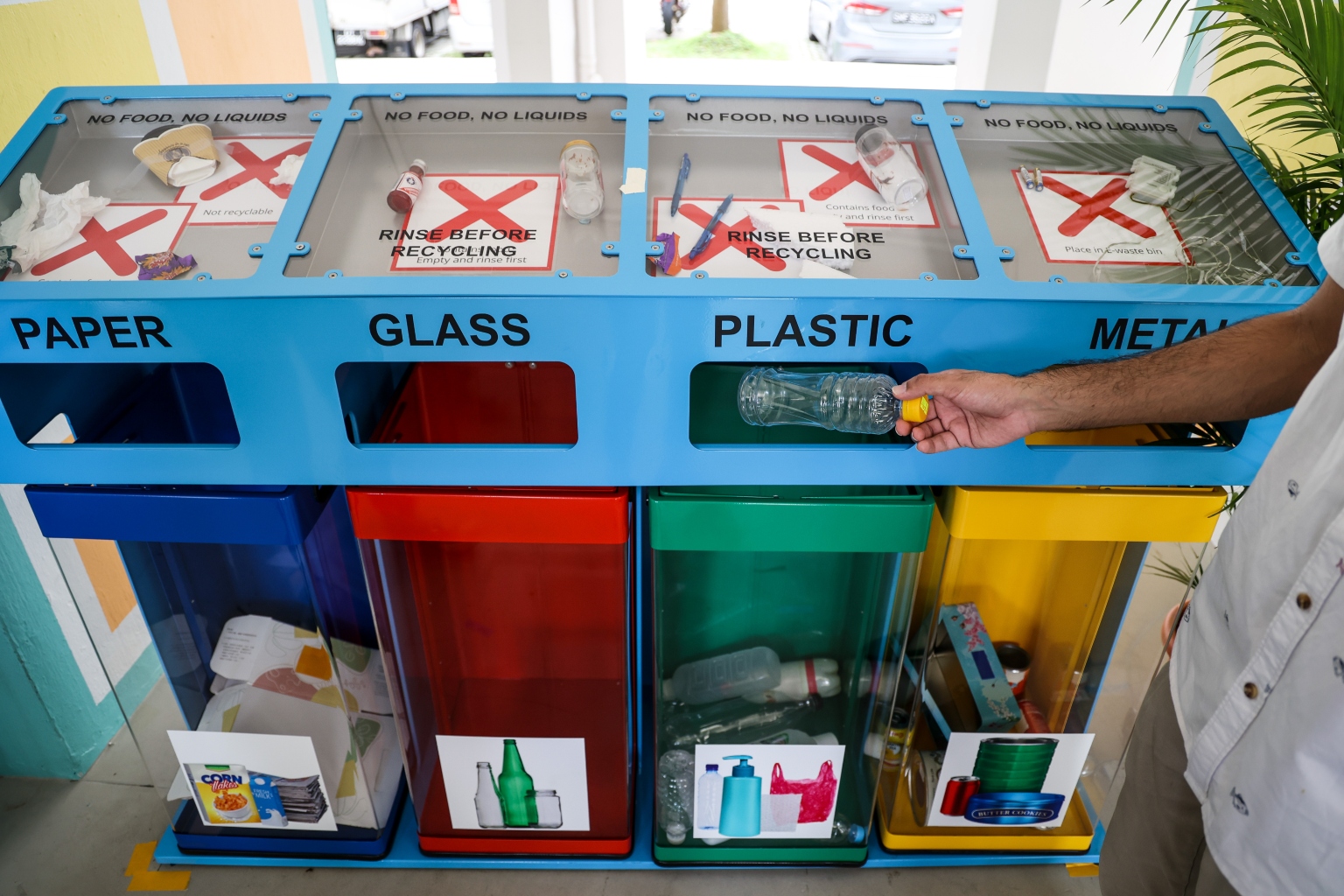Only 13% of S'pore's domestic waste was recycled in 2021, even as households throw out more rubbish
Sign up now: Get ST's newsletters delivered to your inbox

Households generated 1.82 million tonnes of waste in 2021, up from 1.77 million tonnes in 2020.
PHOTO: LIANHE ZAOBAO
Follow topic:
SINGAPORE - The Republic's domestic recycling rate remained at 13 per cent in 2021 - unchanged from 2020's figures, a 10-year low - even as households produced more waste as economic activity resumed after the first year of the pandemic.
The National Environment Agency (NEA), in its annual waste and recycling statistics released on Monday (April 18), said households generated 1.82 million tonnes of waste in 2021, up from 1.77 million tonnes in 2020.
For both years, only 13 per cent of domestic waste was recycled. Between 2017 and 2019, the domestic recycling rate hovered between 17 per cent and 22 per cent.
In 2020, the first year of the pandemic, the collection of recyclables from the domestic sector was put on hold, and restarted gradually only from the third quarter of that year.
Last year, NEA said the waste generation and recycling patterns of 2020 were "unlikely to be repeated in 2021", as the impact of the Covid-19 pandemic gradually eased.
Under the Sustainable Singapore Blueprint, Singapore wants to raise this recycling rate to 30 per cent by 2030.
Contamination in the blue recycling bins is a key obstacle to realising this ambition.
NEA said about 40 per cent of the contents found in the blue recycling bins cannot be recycled owing to leakage, mainly from food and liquid waste, as well as e-waste and styrofoam.
"Households also deposit items such as clothing and soft toys, which should not be placed into the blue bins, but instead donated if they are in good condition," the agency added.
A number of residents also do not wash their recyclables before placing them into the bins, worsening contamination and making the items unsuitable for recycling.
To inform the public about correct recycling practices, NEA has rolled out online content such as a filter on its Recycle Right website to help the public identify what can and cannot be recycled in the blue recycling bins.
Under Singapore's national recycling programme, recycling bins are placed at every block in Housing Board estates. Recycling bins are also given to every household living in landed homes.
To make recycling more convenient for residents, NEA is planning to provide recycling bins later in the year to households that want them so that residents can collect the recyclables before dropping them off at neighbourhood recycling bins.
Overall though, Singapore's recycling rate inched up from 52 per cent in 2020 - the lowest in the decade - to 55 per cent last year, as economic activity picked up and the industrial sector recycled more.
The resumption of more economic and social activities last year led to 10 per cent more waste thrown away compared with 2020.
However, compared with the pre-pandemic period, last year saw 11 per cent less waste recycled, and 5 per cent more thrown away. This was due to lower construction activity and export demands for recyclables, especially for construction and demolition waste, as well as wood and non-ferrous metal, explained NEA.
The recycling rate of plastic waste - one of three major waste streams here - rose slightly from 4 per cent in 2020 to 6 per cent in 2021, but NEA said more needs to be done to improve the rate as it remains low.
The other two priority waste streams are e-waste and food waste. Food waste had a recycling rate of 19 per cent in 2021, similar to 2020.
E-waste recycling got a boost last July, when NEA started a new recycling system with collection bins placed islandwide. There are currently more than 640 e-waste collection bins at locations including electronic stores, supermarkets and community centres.
It was mentioned in Parliament last month that the scheme has collected around 3,500 tonnes of consumer e-waste, thrice the amount collected annually under NEA’s previous National Voluntary Partnership programme, where industry partners led recycling programmes for used electronic items from households.
Commenting on last year's waste statistics, Minister for Sustainability and the Environment Grace Fu said the recycling rate of 55 per cent is still below the pre-Covid-19 level of 59 per cent in 2019.
"To achieve our target of reducing waste-to-landfill per capita by 30 per cent (in Semakau Landfill) by 2030, we must push for more sustainable consumption and production practices," she said on Monday.
She was speaking at the joint opening of the 2022 Singapore International Water Week and the CleanEnviro Summit Singapore.
Held at the Sands Expo and Convention Centre till Thursday, both events are among the first and largest sustainability conferences to be held in the Asia-Pacific since the pandemic hit, with more than 15,000 attendees expected.
Among them are government officials, industry players and academics from around the world who are gathering to network and share best practices on issues such as urban water solutions, coastal protection, enhanced hygiene standards and waste recovery.

